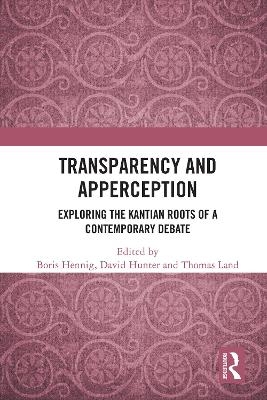
Transparency and Apperception
Exploring the Kantian Roots of a Contemporary Debate
Seiten
2024
Routledge (Verlag)
978-0-367-51302-3 (ISBN)
Routledge (Verlag)
978-0-367-51302-3 (ISBN)
Transparency and Apperception: Exploring the Kantian Roots of a Contemporary Debate explores the links between the idea that belief is transparent and Kant’s claims about apperception. The chapters in this book were originally published in a special issue of the Canadian Journal of Philosophy.
Transparency and Apperception: Exploring the Kantian Roots of a Contemporary Debate explores the links between the idea that belief is transparent and Kant’s claims about apperception.
Transparency is the idea that a person can answer questions about whether she, for instance, believes something by considering, not her own psychological states, but the objects and properties the belief is about. This marks a sharp contrast between a first-person and third-person perspective on one’s current mental states. This idea has deep roots in Kant’s doctrine of apperception, the claim that the human mind is essentially self-conscious, and Kant held that it underlies the responsibility that a person has for certain of their own mental states. Nevertheless, the idea of transparency and its roots in apperception remain obscure and give rise to difficult methodological and exegetical questions. The contributions in this work address these questions and will be required reading for anyone working on this intersection of the philosophy of mind and language, and epistemology.
The chapters in this book were originally published in a special issue of the Canadian Journal of Philosophy.
Transparency and Apperception: Exploring the Kantian Roots of a Contemporary Debate explores the links between the idea that belief is transparent and Kant’s claims about apperception.
Transparency is the idea that a person can answer questions about whether she, for instance, believes something by considering, not her own psychological states, but the objects and properties the belief is about. This marks a sharp contrast between a first-person and third-person perspective on one’s current mental states. This idea has deep roots in Kant’s doctrine of apperception, the claim that the human mind is essentially self-conscious, and Kant held that it underlies the responsibility that a person has for certain of their own mental states. Nevertheless, the idea of transparency and its roots in apperception remain obscure and give rise to difficult methodological and exegetical questions. The contributions in this work address these questions and will be required reading for anyone working on this intersection of the philosophy of mind and language, and epistemology.
The chapters in this book were originally published in a special issue of the Canadian Journal of Philosophy.
Boris Hennig, David Hunter and Thomas Land are faculty members in the Philosophy Department at Ryerson University in Toronto, Canada.
1. Assertion and transparent self-knowledge
2. Kant and the transparency of the mind
3. The puzzle of transparency and how to solve it
4. Spontaneity and Self-Consciousness in the Groundwork and the B-Critique
5. ‘I do not cognize myself through being conscious of myself as thinking’: Self-knowledge and the irreducibility of self-objectification in Kant
6. Kant’s “I think” and the agential approach to self-knowledge
7. Transparency and reflection
| Erscheinungsdatum | 31.01.2024 |
|---|---|
| Verlagsort | London |
| Sprache | englisch |
| Maße | 156 x 234 mm |
| Gewicht | 453 g |
| Themenwelt | Geisteswissenschaften ► Philosophie |
| ISBN-10 | 0-367-51302-1 / 0367513021 |
| ISBN-13 | 978-0-367-51302-3 / 9780367513023 |
| Zustand | Neuware |
| Haben Sie eine Frage zum Produkt? |
Mehr entdecken
aus dem Bereich
aus dem Bereich
wie Philosophie uns helfen kann, unseren Weg zu finden
Buch | Hardcover (2023)
dtv Verlagsgesellschaft
26,00 €


